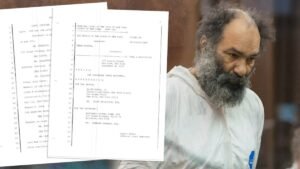Biden pronounces new tariffs on electrical autos from China : NPR


President Biden places on a United Auto Employees t-shirt in Belvidere, In poor health. on Nov. 9, 2023. Biden on Tuesday is asserting new tariffs on imports of Chinese language items, together with electrical autos.
Scott Olson/Getty Photos
cover caption
toggle caption
Scott Olson/Getty Photos

President Biden places on a United Auto Employees t-shirt in Belvidere, In poor health. on Nov. 9, 2023. Biden on Tuesday is asserting new tariffs on imports of Chinese language items, together with electrical autos.
Scott Olson/Getty Photos
President Biden will slap tariffs on $18 billion of imports of products from China together with electrical autos, semiconductors, and medical merchandise to guard U.S. employees and firms within the strategic sectors and punish China for unfair commerce practices.
He may even maintain in place the tariffs that former President Donald Trump had positioned on greater than $300 billion of imports from China.
U.S. Commerce Consultant Katherine Tai instructed Morning Version that China closely subsidizes its electrical automobile business, resulting in costs so low that American producers might “actually be crushed by what has been produced by these anti-competitive practices in Beijing.”
The transfer comes as Biden pushes ahead to implement three items of laws that comprise a whole bunch of billions of subsidies to spice up the home manufacturing and clear vitality sectors — and forward of a presidential election the place commerce and jobs will once more be a problem.

U.S. Commerce Consultant Katherine Tai delivers remarks throughout a Asia-Pacific Financial Cooperation (APEC) assembly in San Francisco on Nov. 14, 2023.
Kent Nishimura/Getty Photos
cover caption
toggle caption
Kent Nishimura/Getty Photos

U.S. Commerce Consultant Katherine Tai delivers remarks throughout a Asia-Pacific Financial Cooperation (APEC) assembly in San Francisco on Nov. 14, 2023.
Kent Nishimura/Getty Photos
“We all know China’s unfair practices have harmed communities in Michigan and Pennsylvania and across the nation that are actually having the chance to come back again because of President Biden’s funding agenda,” Lael Brainard, Biden’s prime financial adviser, instructed reporters.
This is a listing of the brand new tariffs
Many of the new tariffs cowl objects that the Biden administration has sought to have made in America by way of investments within the Inflation Discount Act, the CHIPS and Science Act and the Bipartisan Infrastructure Legislation.
Some will increase will happen this 12 months. They embrace tariffs of:
- 100% on electrical autos, up from 25%
- 50% on photo voltaic cells, up from 25%
- 50% on syringes and needles, up from zero
- 25% on lithium-ion batteries for electrical autos, and battery components, up from 7.5%
- 25% on sure important minerals, up from zero
- 25% on metal and aluminum merchandise, up from a variety of zero to 7.5%
- 25% on respirators and face masks, up from zero to 7.5%
- 25% on cranes used to unload container ships, up from 0%
Different hikes shall be phased in, together with:
- 50% on semiconductors, up from 25%, by 2025
- 25% on different lithium-ion batteries, by 2026
- 25% on pure graphite and everlasting magnets, up from zero, by 2026
- 25% on rubber medical and surgical gloves, up from 7.5%, by 2026
The White Home says that is totally different from Trump’s strategy
Trump had made tariffs on China one in all his signature coverage strikes when he was within the White Home. At first, some Democrats warned this might actually harm the economic system — and that American shoppers would pay the worth.
Biden’s workforce started reviewing these tariffs when he took workplace, and now has determined to maintain them in place — although it’s engaged on an exclusion course of for equipment utilized by home producers, explicit within the photo voltaic business.
“One of many challenges is as soon as tariffs have been imposed, it’s fairly tough politically to cut back them — as a result of the affected business tends to get used to them, like them, function with them as baked into their plans,” stated Michael Froman, who was U.S. Commerce Consultant through the Obama administration.
The White Home has tried to differentiate its technique from Trump’s strategy. It factors to feedback made by Trump in rallies and interviews that he would broaden tariffs on all imported items, together with concentrating on Chinese language automobiles, if he wins the election — one thing that they stated would hike client costs. Biden’s technique is a “smarter strategy,” Tai instructed Morning Version.
China expresses ‘sturdy dissatisfaction’
The White Home has downplayed the danger that the brand new tariffs might spark retaliation from China, saying that the problems have been mentioned throughout conferences of prime U.S. and Chinese language officers, and have been unlikely to come back as a shock.
China’s commerce ministry stated Beijing “firmly opposes” the choice, and stated the assessment course of had been “abused” for home political causes. “China expresses its sturdy dissatisfaction,” it stated.
The choice to lift tariffs is a violation of Biden’s guarantees “to not search to suppress China or curb its improvement” or decouple from China, the ministry stated. It stated the motion was out of step with the spirit of consensus reached between Biden and Chinese language chief Xi Jinping, and “will critically have an effect on the environment round bilateral cooperation.”
“China will take resolute measures to defend its rights and pursuits,” it stated.
NPR China Correspondent John Ruwitch contributed to this report









